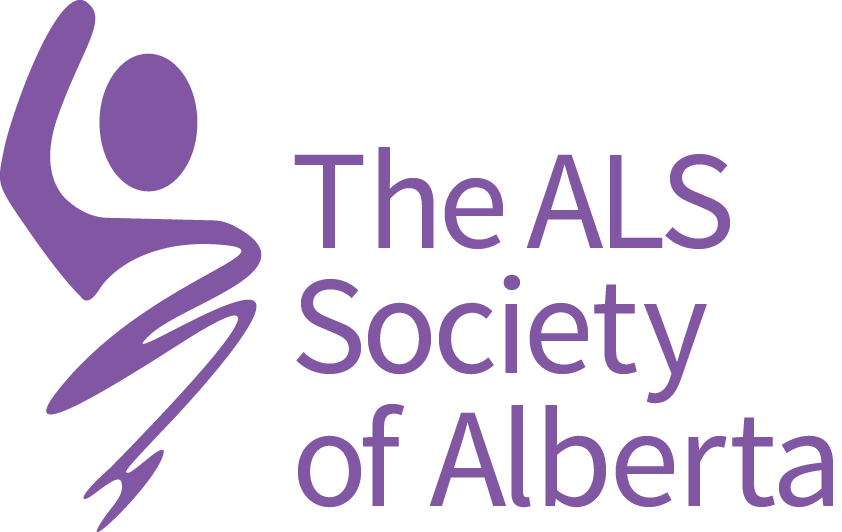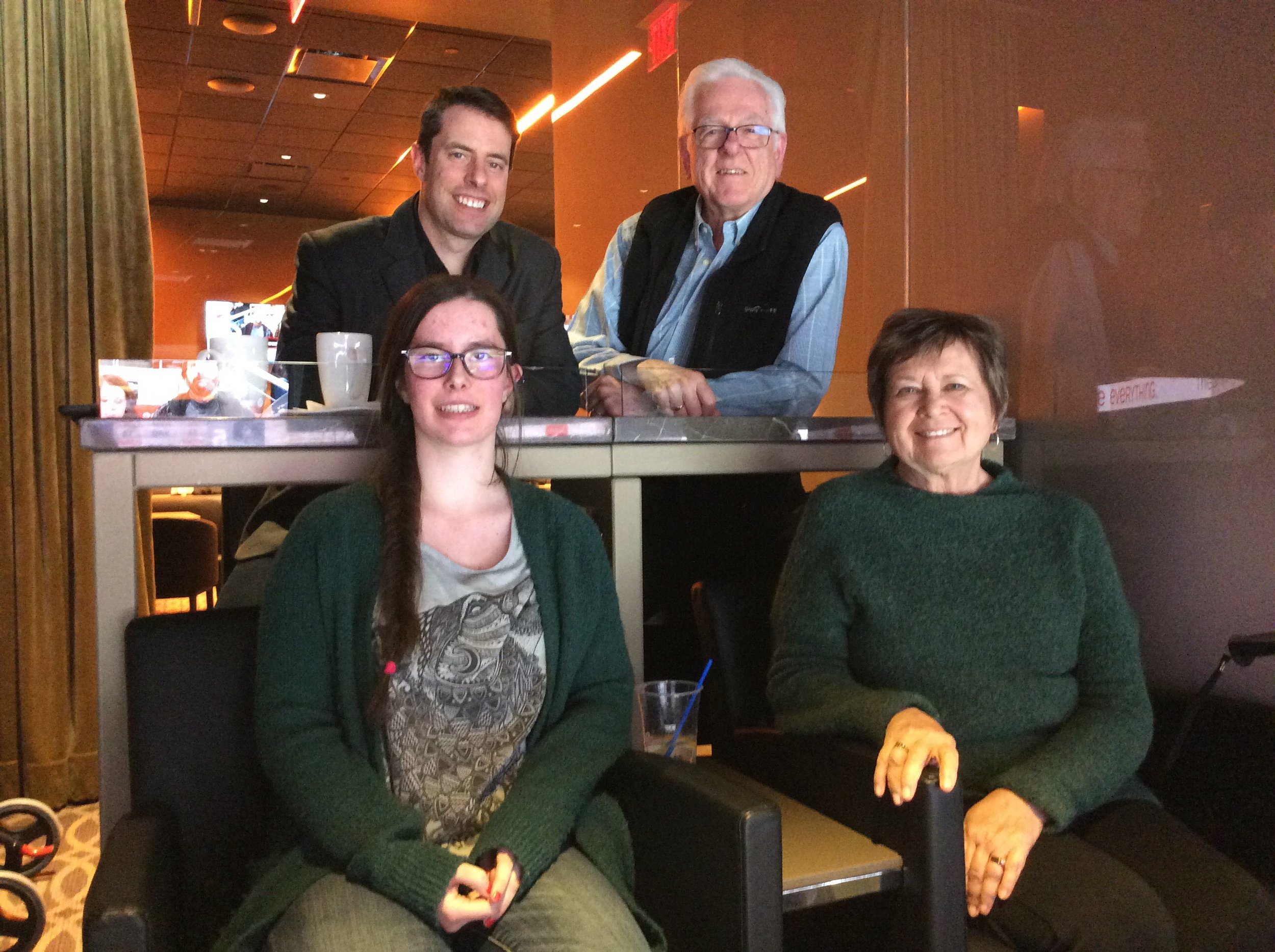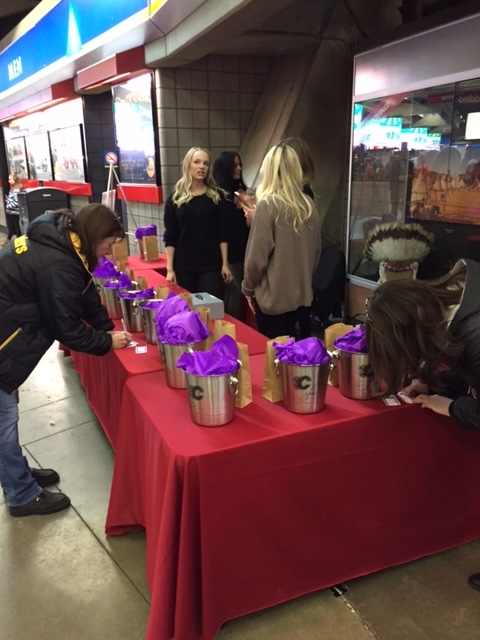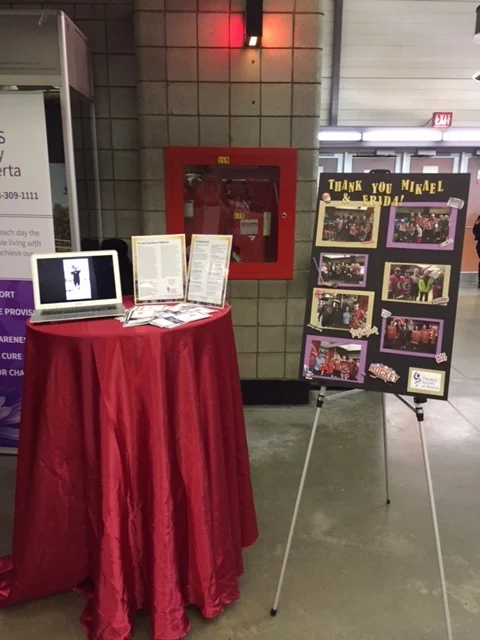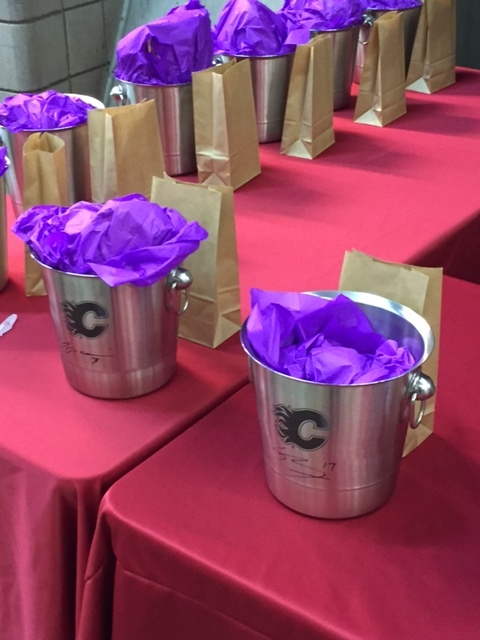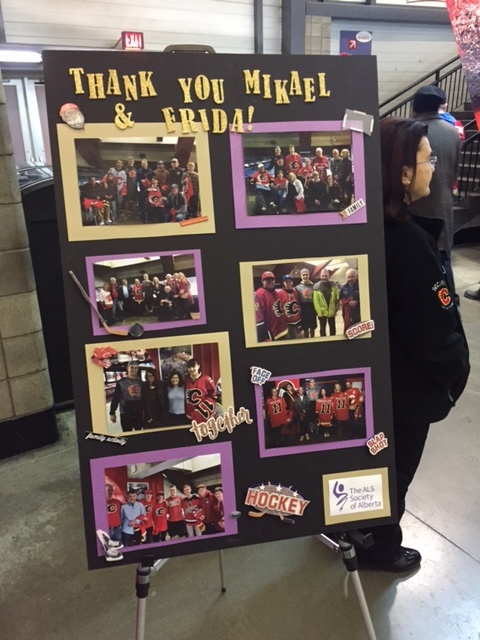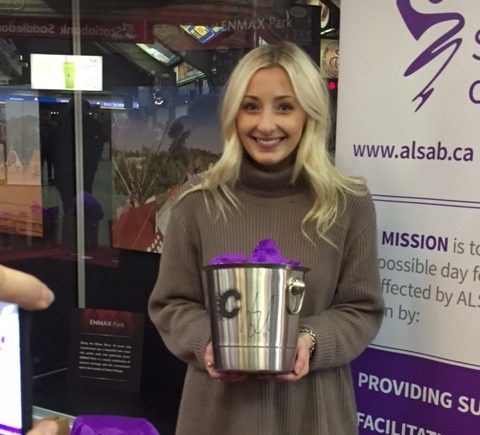"Walking into the Neurologist’s clinic hoping to hear there was a solution to whatever was causing my symptoms and walking out with a diagnosis of ALS, was definitely not how I had expected that day to go. Even though I was a practicing Registered Nurse, and had worked on a palliative care unit helping others dealing with a terminal diagnosis, I felt totally unprepared to hear one applied to me. I am blessed to have supportive family and friends, and am thankful for a belief that in spite of the storms, I have much for which to give thanks. However, the reality of the situation and the gravity of the diagnosis of ALS did cause me angst. I had many questions and concerns about not only the quantity, but quality of my life over the next few years. The ALS Society quickly became another anchor in the storm. The Society, from Administrators to technicians to liaisons to volunteers and peers, have provided much needed and greatly appreciated support. “You are not alone; we are here to help” – words spoken to me during my first visit with the ALS Society. They were not empty words; the Society has played a vital role in navigating with me through the maze of needs and have provided not only moral and emotional support but many practical physical devices to assist my activities of daily living. I cannot thank them enough for the difference they are making in my life!" - Donna Strome
Spring Newsletter
The ALS Compassionate Heart
The Fifth Avenue Collection is donating $20 to the ALS Society for each ALS Compassionate Heart necklace purchased in Alberta. The ALS Compassionate Heart is a symbol of caring and support for people affected by ALS, the client, family, friends, physicians and caregivers. The ALS Compassionate Heart features 61 Swarovski Crystals each individually encased in a bezel setting. The pendant and the chain are finished in a rich Rhodium Finish. The chain is 20” and adjusts to 22”. It is nickel, lead and cadmium free.
Cost is $59.99 and includes tax and shipping.
2017 Edmonton WALK for ALS Kick-off Brunch
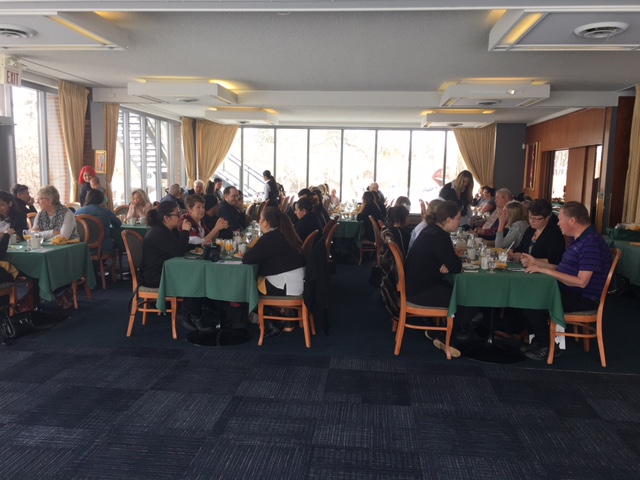
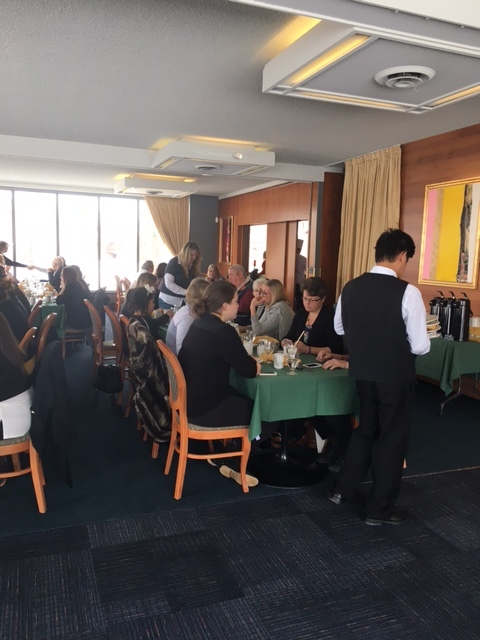
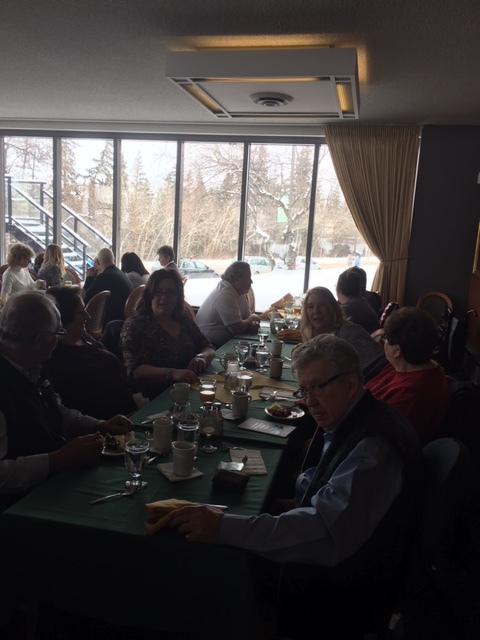
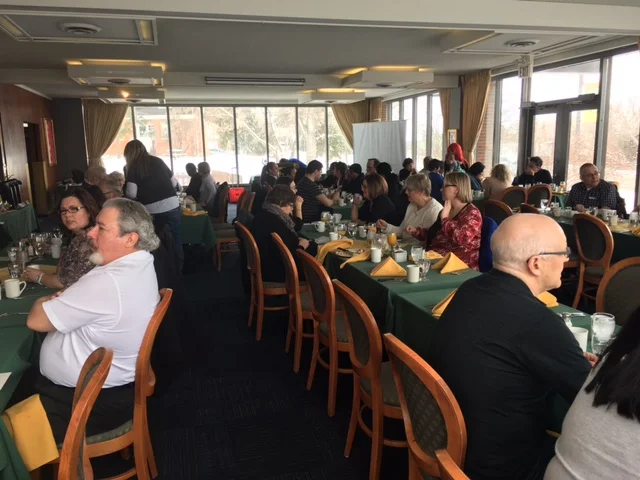
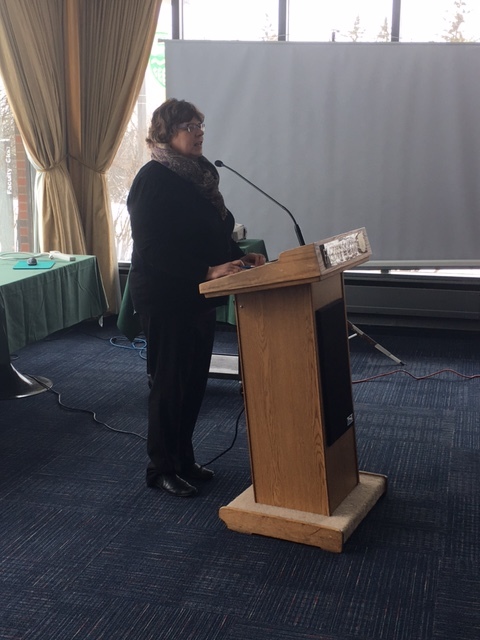

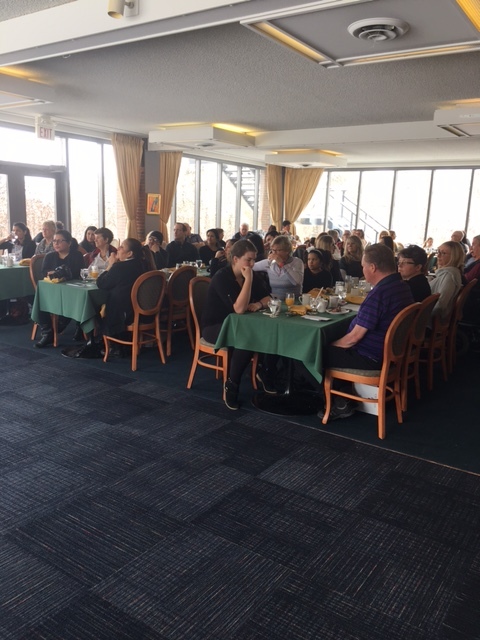
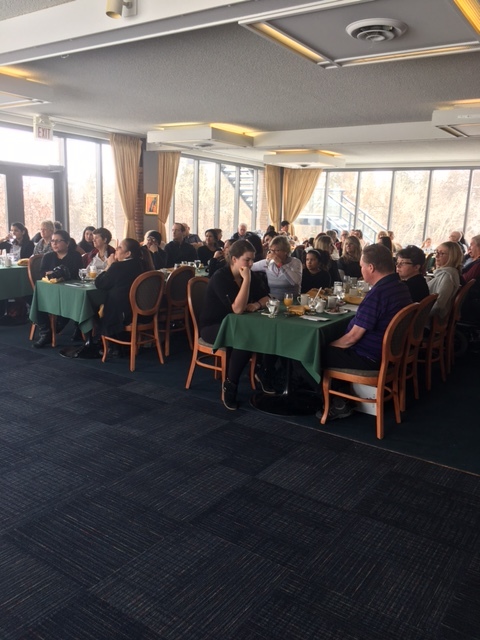
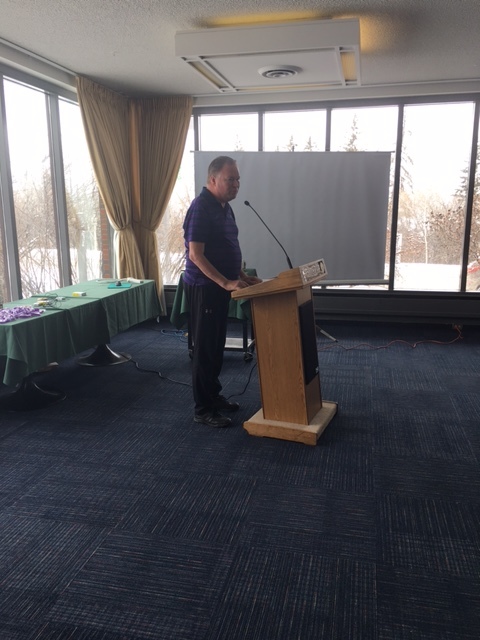
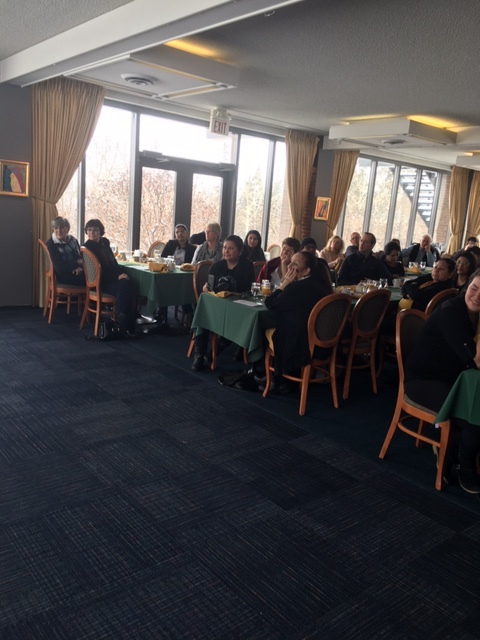
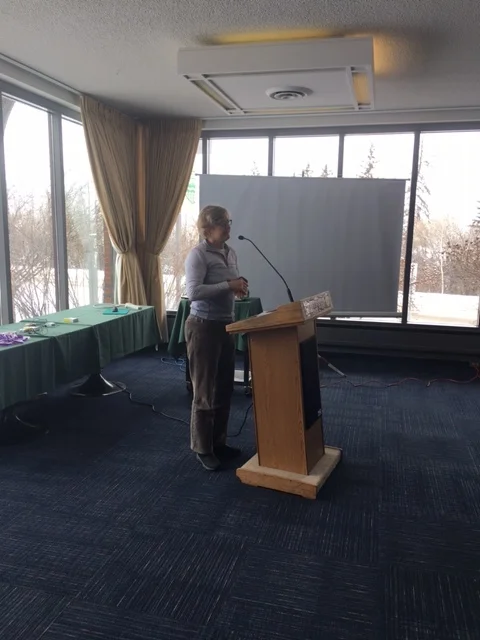

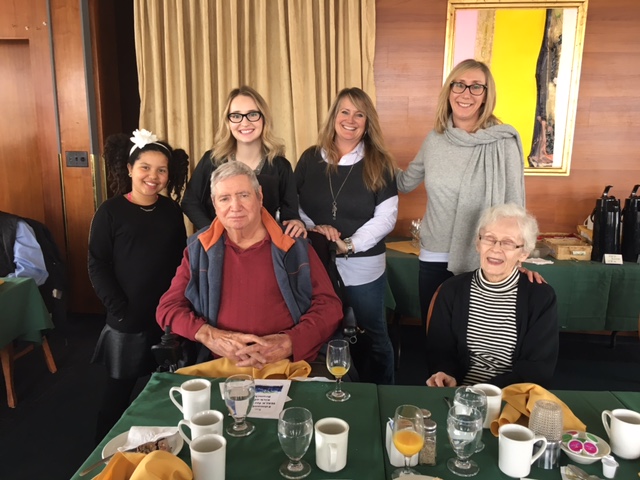
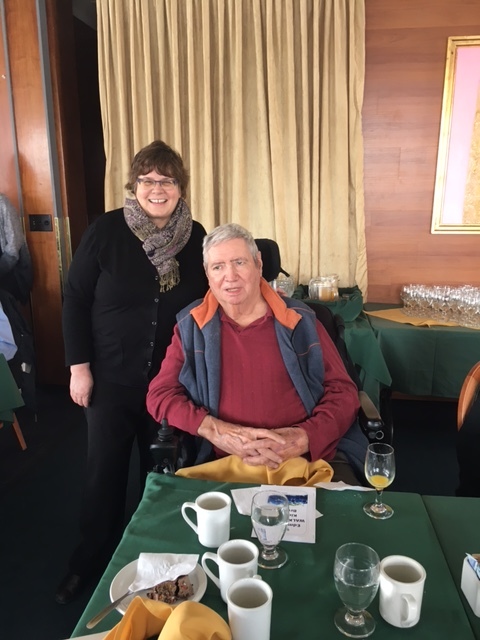
What a fantastic day at this year's Edmonton WALK for ALS Kick-off Brunch! Speakers included Board Member Cathy Martin, Jody Round from the WALK Committee, WALK Ambassador Fred Gillis, and the winner of the 2016 Team Challenge, Cathy Tuckwell. The afternoon finished off with an ALS Society of Alberta themed game Family Feud! Thank you to all who attended the brunch. Your support makes a significant impact within the ALS community.
Introducing the 2017 Betty's Run for ALS Ambassador
Jody Pfeifer
Hans Christian Andersen said, “Just living is not enough. One must have sunshine, freedom and a little flower.” This little quote struck me as being so special and meaningful 15 years ago when I first discovered it. Going through papers and getting organized a month ago, it was rediscovered and this little saying took on a whole new special meaning to me.
My name is Jody Pfeifer. On August 3, 2016, I was diagnosed with ALS. Someone asked me, “Why you?” I responded “Why not me? This disease does not discriminate. If not me then someone else would be getting the diagnosis. It just as easily could have been you. The selection is purely random.” Now I am the face of ALS.
I have lived a full life of fantastic adventures and memories. Having grown up in Vancouver, I was active for most of my life playing team sports, racquet sports, on track teams, jogging and doing lots of skiing. Right out of high school I worked for a brokerage firm for ten years. When the firm was taken over in 1989, I moved to Calgary and never looked back. Little did I know I was about to experience the biggest adventure of my life! My son Ryan was born in 1992 and as a single parent still working in the brokerage business, I bought my first house in 1995. The purchase of that house ended up being the best trade I ever made! I still own that little house to this day and my son is living in it at the age of 24. My two greatest accomplishments have become one!
Although the majority of my family lives west of the Rockies, I have tons of “family” in Calgary. The people I’ve met and friends I have made over the years are considered family. These incredible people have shared their lives and homes with my son and I. They’ve been generous with their love and selfless with their caring and time. I love everyone in “my family” very much and it is this group of people who are now a part of my latest journey.
Having been fiercely independent my whole life, I’ve gone from being able to do/fix anything (tools included) to not being able to use an elastic or open a Ziploc bag. With each ongoing muscle twitch I think of the paralyzing, insidious dark journey this disease is taking through my body and wonder about what I won’t be able to do tomorrow? We all have to go sometime; it’s just a matter of when and how……
For the most part I’m staying positive, thankful for having so many incredible people in my life and having the gift of time to tie up loose ends. I’ve discovered that the littlest things have so much more meaning now - a little flower, dogs playing, fresh air and the warmth of the sun. One must have freedom, yes, but one must also have the freedom of their bodies to move to continue to take you on more adventures…..
Just being alive in your life isn’t enough. LIVE your life because none of us knows if someday all you will have left is the memories of a life well lived…..
Jody Pfiefer, 2017 Ambassador for Betty’s Run for ALS
Introducing the Edmonton WALK for ALS Ambassador
“Hello, my name is Fred Gillis and this year I am honoured to be the ALS Society of Alberta Ambassador for the Edmonton WALK for ALS on June 10, 2017. I am a law enforcement officer with the RCMP and for the past 29 years I have worked in various locations across Canada. I am but one of the “Many Faces of ALS”. On December 1, 2015, I was diagnosed with ALS. I had been losing my arm strength and coordination for almost a year. It was devastating news and acceptance was difficult because you learn right away that ALS affects everyone around you; your family, your friends and your career. We immediately began to focus on the way forward which included education, communication, support and physical therapy. Since my diagnosis I have been getting support and assistance from the University of Alberta ALS Multidisciplinary Clinic team, the ALS Society of Alberta and the ALS Edmonton Society Support Group. ALS continually makes me adapt to the progression of the disease and I cannot stress enough how grateful I am to be able to pick up the phone and have someone understand my situation and help me come up with solutions to make living easier. I have only two words to describe the ALS Society of Alberta – love and support. Most of this support and assistance would not exist if it were not for the generous financial support by Canadians. I am taking part in two ALS clinical research trials, one of which is spearheaded by Dr. Sanjay Kalra, co-medical director of the Alberta Health Services’ ALS Clinic in Edmonton. Dr. Kalra and his research team are using Magnetic Resonance Imaging (MRI) technology to study and learn about changes in the brains of people with ALS and to track the progression of the disease in hopes of developing a better way to detect and ultimately cure ALS. ALS research gives me hope that we will one day find a cure. This is all about Canadians helping Canadians. I sincerely hope everyone will come out and support the 2017 Edmonton WALK for ALS!"
Songs for Ken
To say we had an amazing weekend at Songs for Ken would be an understatement. This two-day concert raised a tremendous amount of funding and awareness in both Calgary and Fort Macleod, and brought the community together for a night of music and memories. Our sincerest gratitude to Brooke Wylie, The Polyjesters, Tanner James, The Sadler Brown Band, Oscar Lopez, Maureen Chambers, Randall Wiebe and the amazing organizer, John Wort Hannam. We could not be more grateful for the support within the Alberta music community. This was the third annual Songs for Ken event, which began in honour of John Wort Hannam's childhood friend, Ken Rouleau, who lived with ALS.
An Evening at Rogers Place!
Thank you to the Edmonton Oilers Community Foundation for providing one of our families with deluxe Oil Kings tickets at Rogers Place! Pictured in the photos are Helen Banks, her husband Jim, son-in-law Ryan and granddaughter Eilidh!
Support the ALS Society through an online Scentsy party!
Do you love Scentsy products and giving back to the community? Eren Wiebe is hosting a two-week online Scentsy party is support of the ALS Society of Alberta! Click here to browse and shop for products - even just a small purchase makes an impact in the lives of those affected by ALS!
Bob Rock Invitational Golf Tournament and Memorial Evening
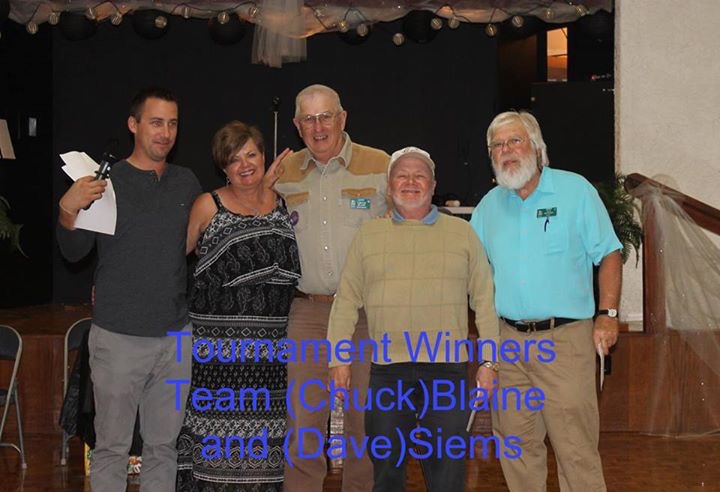
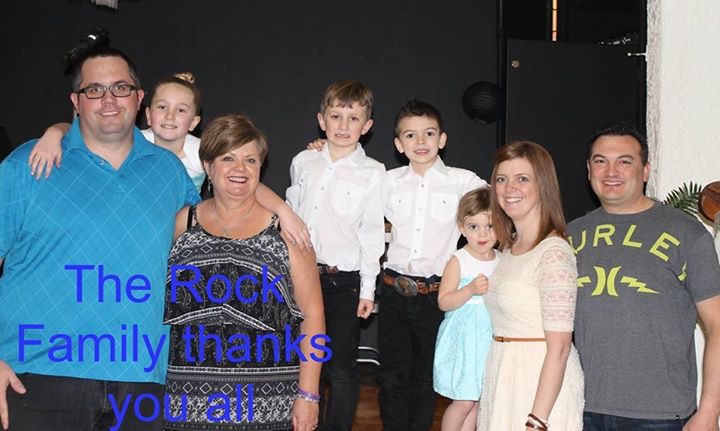
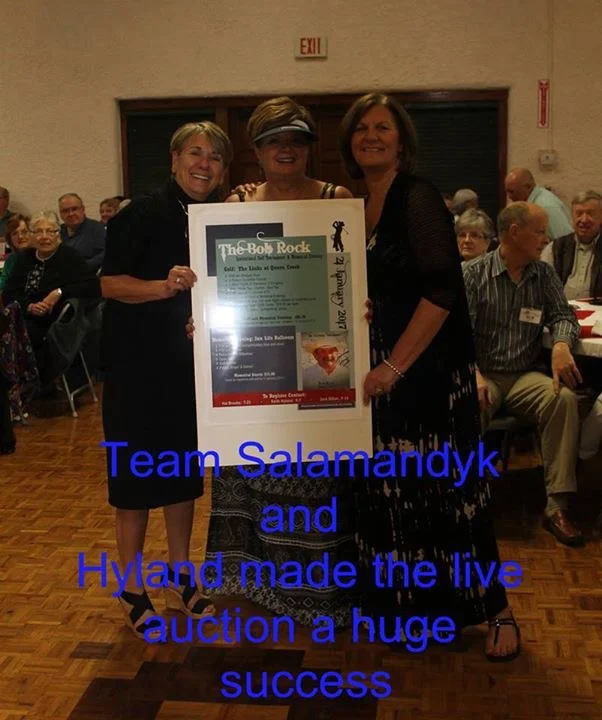

The Bob Rock Invitational Golf Tournament and Memorial Evening took place on Saturday, Jan. 21 in Arizona! There was an exceptional turnout, with over $3,000 raised for the ALS Society of Alberta. Thank you to all event organizers, volunteers, donors and supporters!
Third Annual Songs for Ken
Songs for Ken will take place on Feb. 10 in Calgary and Feb. 11 in Fort Macleod. Tickets for the Calgary show can be purchased by clicking here, or for the Fort Macleod show by clicking here. Join us for this amazing, heartfelt event.
Proud recipient of the St. Albert Community Foundation grant
"Amyotrophic lateral sclerosis, abbreviated as ALS or otherwise known as Lou Gehrig’s disease, is unpredictable in many ways. It can make one’s physical abilities dramatically different from one day to the next.
That’s why the ALS Society of Alberta keeps a warehouse literally filled with different types of accessibility equipment to lend out to those who need it. Actually, it has two: one in Edmonton and one in Calgary. The ALS Society was named as a recipient when St. Albert Community Foundation gave out its annual grants last month."
Click here to read the rest of the article from the St. Albert Gazette
Thank you, Mikael Backlund!
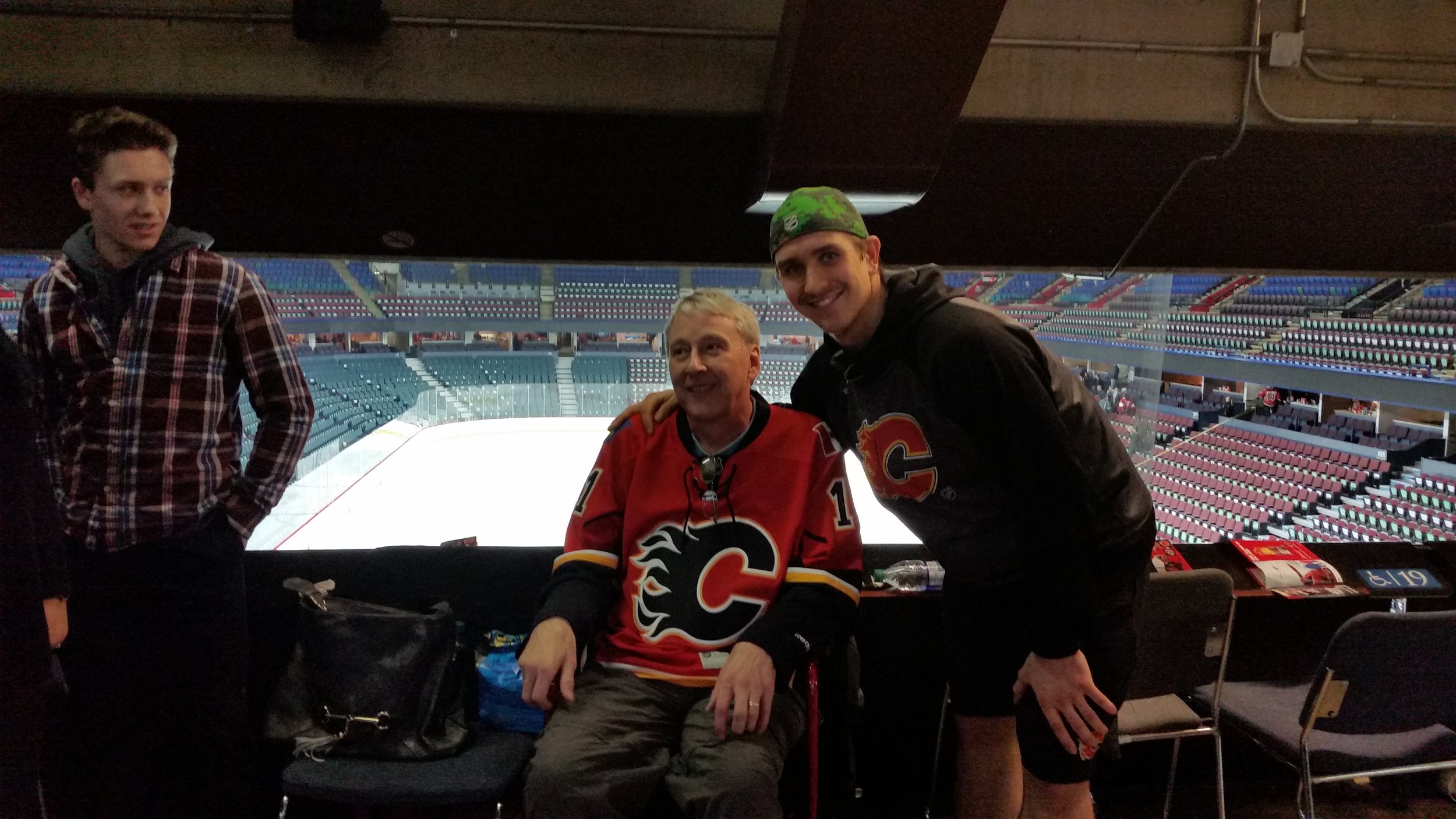
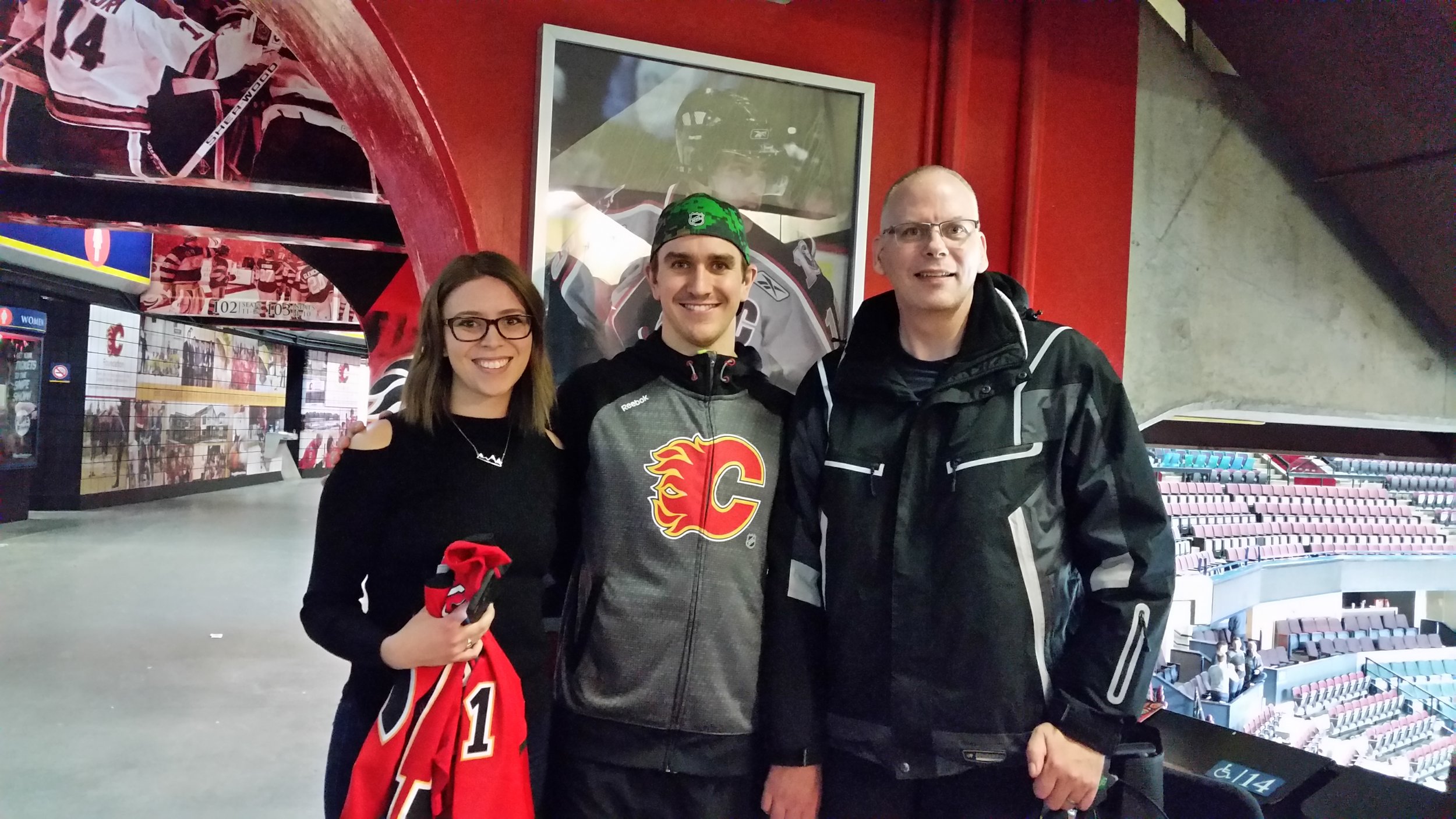
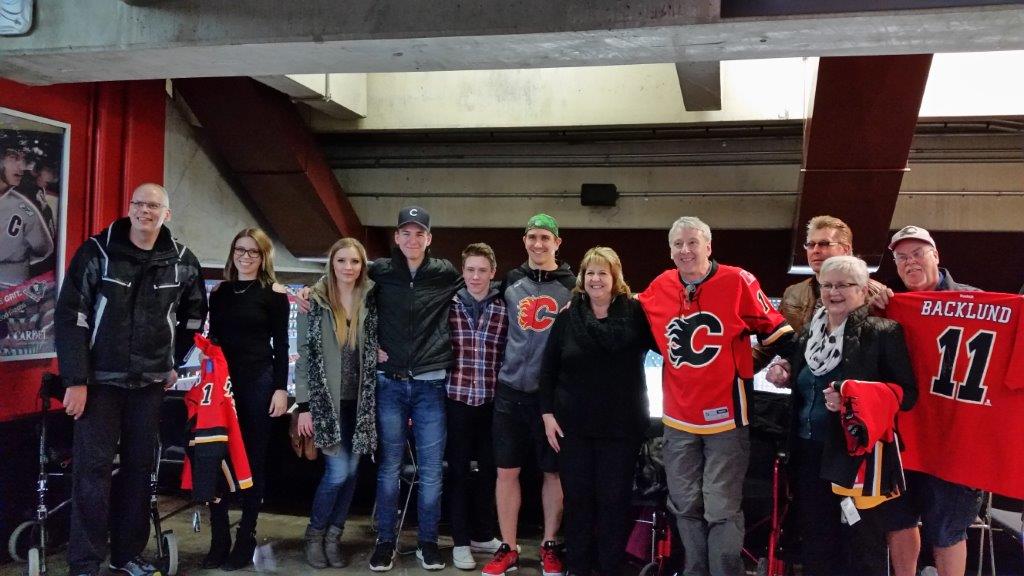

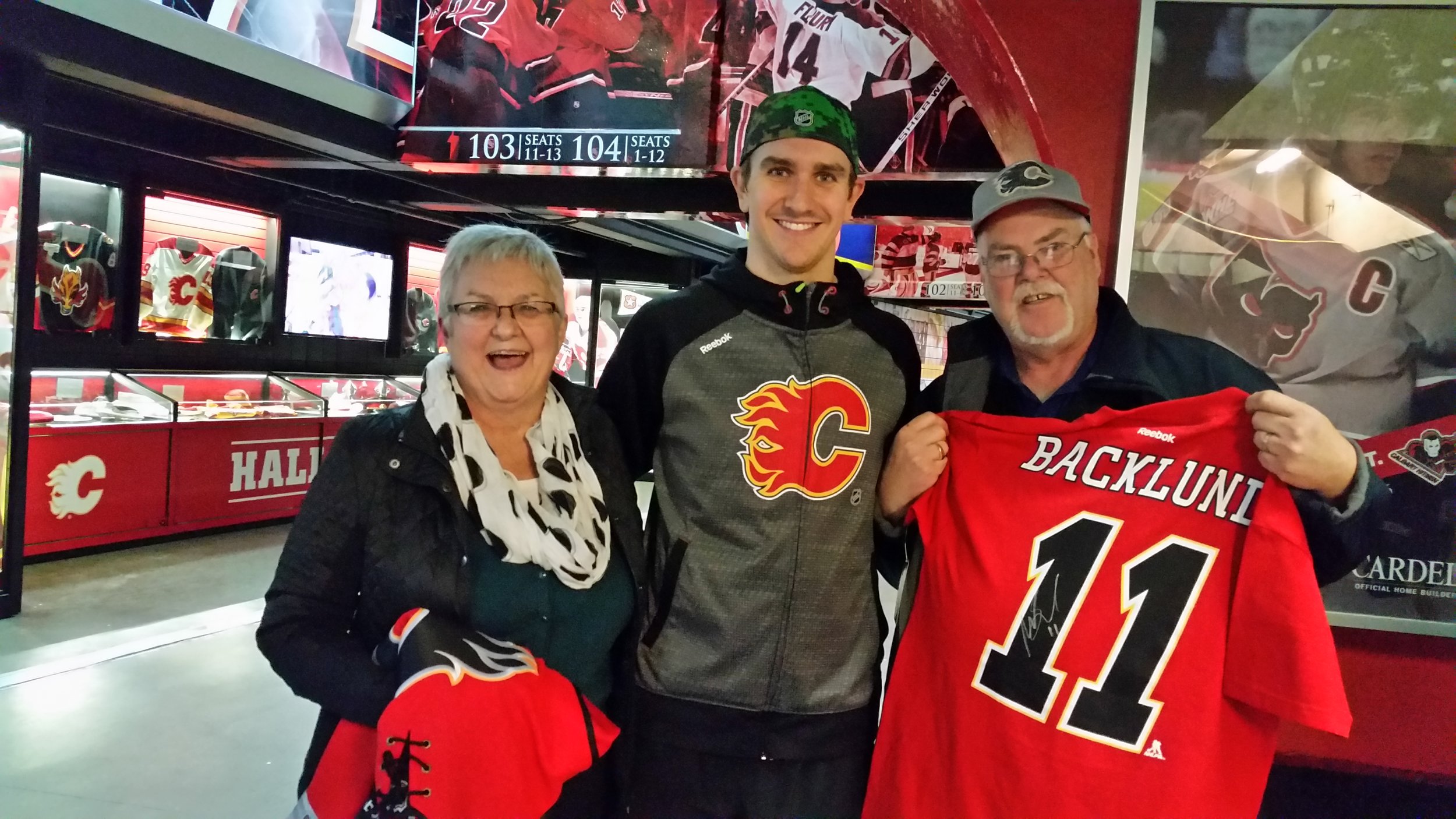
Congratulations to Mikael Backlund and the Calgary Flames for your incredible win last night! We are so grateful to Mikael for his generosity in hosting our families at a game each month. We had such an incredible time last night!
Another great night at the Dome!
What a great night at the game on Saturday! Thank you to Mikael Backlund of the Calgary Flames for all that you do for our families!
ALS Art Auction
Click here to participate in the ALS Society of Alberta's first-ever online art auction. Bidding closes Dec. 19!
ALS Ice Bucket Raffle with the Calgary Flames!
We are still smiling after the incredible night spent with the Calgary Flames "Better Halves" at an amazing fundraiser. Each player raffled off a signed ice bucket with a prize included, leading to awareness across the entire Saddledome. A special thank you to Mikael Backlund and Frida Engstrom for your incredible support of the Society. You have made such a significant impact!
Winter Newsletter
Giving Tuesday raises $6,800!
Thank you to everyone who donated to the ALS Society of Alberta in honour of Giving Tuesday. We are thrilled to announce that over $6,800 was raised, far exceeding our goal of $5,000. These funds will go to our Support for Champions program, to provide funds for children affected by ALS.
New Canadian investments in ALS research reflect growing knowledge about the disease and increasing likelihood of effective treatments being developed
ALS Canada and Brain Canada award $4.5 million in research funding; nearly $20 million invested in ALS research in Canada since 2014’s Ice Bucket Challenge
The ALS Societies across Canada, in partnership with Brain Canada, today announced $4.5 million in funding for nine new ALS research projects. This means that since the Ice Bucket Challenge became a social media phenomenon in 2014, nearly $20 million has been invested in Canadian ALS research at a time when it has the potential to make the greatest impact.
ALS, or amyotrophic lateral sclerosis, is a disease that gradually paralyzes the body, leaving people without the ability to move, talk, swallow and eventually breathe. Most people die within two to five years of being diagnosed with ALS because the disease has no effective treatment or cure. However, ALS research has advanced to a point that many ALS research experts believe effective treatments are now a matter of ‘when’ not ‘if.’
“We hear often from people and families living with ALS that the promise of research discovery is something they can be hopeful about. The challenge is that research takes time, which is exactly what people living with ALS don’t have – and why the Ice Bucket Challenge has been such a game-changer,” said Tammy Moore, CEO of ALS Canada. “Because of the increased funding that the Ice Bucket Challenge has made available, we have been able to make more significant research investments than ever before. We are grateful to Canadians who donated to the Ice Bucket Challenge, to our ALS Society partners across the country and to Brain Canada and the federal government's Canada Brain Research Fund for making this research investment possible.”
“Brain Canada’s partnership with ALS Canada has enabled greater investment in ALS research, which will in turn accelerate progress towards the development of effective treatments,” said Inez Jabalpurwala, President and CEO, Brain Canada Foundation. “In addition, the discoveries that will result from this research funding have the potential to inform how we approach other neurodegenerative diseases with similar underlying mechanisms.”
The nine projects include two large-scale, multi-year team initiatives – one of which is using stem cell technology to better understand and potentially treat ALS, while the other is studying in a new way the gene most commonly linked to ALS development – and seven smaller studies that enable investigators to explore out-of-the-box research.
“Five years ago, the breadth of ALS research we are funding today would not have been possible simply because we didn’t know enough about the disease to be able to ask the kinds of questions that today’s researchers are investigating in their work,” said Dr. David Taylor, Vice President of Research at ALS Canada. “The fact that we now have the ability to explore ALS from different angles reflects the growing body of knowledge about the disease and the increasing likelihood of effective treatments being developed.”
A research team led by Dr. Guy Rouleau of McGill University and the Montreal Neurological Institute has been awarded $2.2 million to study motor neurons and astrocytes created from people living with different forms of ALS via stem cell technology. Dr. Rouleau and his team, which includes other collaborators at McGill University and the Montreal Neurological Institute as well as Université de Montréal and Université Laval, will study the biology of these stem cells to determine if their characteristics in the laboratory can represent different forms of human disease and further develop them as a potential screening mechanism for therapeutics. The tools and tests created in this project will be valuable for both Canadian and global ALS researchers as new resources to understand the disease and find new ways to treat it.
A research team led by Dr. Janice Robertson of University of Toronto has been awarded $1.6 million to understand whether the most common genetic abnormality in ALS, which occurs in the C90RF72 gene, causes or contributes to the disease through a loss of the gene’s normal biological function. The majority of the research community is focusing on how the genetic abnormality in C9ORF72 might lead to an extra, toxic function, but in this five-year study, the team – which includes other collaborators at the University of Toronto as well as Sunnybrook Health Sciences Centre, McGill University and the Montreal Neurological Institute, and the University of British Columbia – will comprehensively analyze the potential damage to motor neurons lacking C9ORF72, and examine if both loss and gain of function mechanisms combine to cause ALS. This knowledge could fundamentally alter how therapeutics are developed for common forms of ALS as well as frontotemporal dementia (FTD), which often occurs with ALS.
Other projects that have been awarded $100,000 each in funding are:
· Dr. Gary Armstrong at the Montreal Neurological Institute and McGill University is using a state-of-the-art technique in genetic manipulation to create new zebrafish models of ALS for the most prominent genetic cause of the disease, which relates to mutations in the C9ORF72 gene.
· Dr. Neil Cashman at the University of British Columbia is using a unique fruit fly model to study whether a key toxic ALS protein can leap between neurons to explain spread of disease throughout the body.
· Dr. Charles Krieger at Simon Fraser University is studying a substance called adducin that is critically linked to health at the site of connection between motor neurons and muscle, in order to understand whether this substance might represent a target for treatment to slow the progression of ALS.
· Dr. Éric Lécuyer at Université de Montréal is using a unique set of scientific tools to comprehensively analyze the contents of key structures in ALS called stress granules.
· Dr. Marlene Oeffinger at the Institut de recherches cliniques de Montréal is studying structures called paraspeckles to understand their content and how they function, as well as how they are altered in neuronal cells that have ALS-causing mutations.
· Dr. Alex Parker at the Université de Montreal is undertaking a study to understand how probiotics slow down the progression of ALS symptoms in worms.
· Dr. Lisa Topolnik at the Centre Hospitalier de l’Université Laval will study how certain neurons called interneurons, which connect to motor neurons in the brain, might be implicated in the early stages of ALS.
All of the research projectswere selected through a competitive peer review process, regarded as the international benchmark of excellence in assessing projects for research funding. The peer review process engages a panel of international experts in ALS and other neurodegenerative diseases in evaluating and ranking all proposed research projects based on their scientific merit and on the potential to most quickly advance the field of ALS research in order to develop effective treatments. All aspects of the peer review process are executed in full partnership with Brain Canada, whose funds are provided through a partnership with Health Canada known as the Canada Brain Research Fund.
Approximately 1,000 Canadians are diagnosed with ALS each year. At any time, there are approximately 2,500 to 3,000 people living with the disease in Canada, and the average cost of caring for one person with ALS is between $150,000 and $250,000. Every day, two to three Canadians will die of ALS.
About Canada’s ALS Societies
ALS Societies across Canada fundraise on a regional basis to provide services and support to people and families living with ALS and to contribute to the funding of the ALS Canada Research Program. The ALS Canada Research Program funds peer-reviewed research grants and fosters collaboration amongst Canadian researchers, helping to nurture new ideas and build capacity. ALS Societies advocate federally, provincially and locally on behalf of people and families living with ALS for better government support and access within the healthcare system.
About Brain Canada and the Canada Brain Research Fund
Brain Canada is a national non-profit organization headquartered in Montreal, Quebec, that enables and supports excellent, innovative, paradigm-changing brain research in Canada. For more than one decade, Brain Canada has made the case for the brain as a single, complex system with commonalities across the range of neurological disorders, mental illnesses and addictions, brain and spinal cord injuries. Looking at the brain as one system has underscored the need for increased collaboration across disciplines and institutions, and a smarter way to invest in brain research that is focused on outcomes that will benefit patients and families. Brain Canada’s vision is to understand the brain, in health and illness, to improve lives and achieve societal impact.
The Canada Brain Research Fund is a public-private partnership between the Government of Canada and Brain Canada, designed to encourage Canadians to increase their support of brain research, and maximize the impact and efficiency of those investments. Brain Canada and its partners have committed to raising $120 million, which is being matched by Health Canada on a 1:1 basis for a total of $240 million. For more information, visit www.braincanada.ca.
Another great night with the Calgary Flames!
A HUGE thank you to Mikael Backlund for hosting our families at last night's Calgary Flames Game! We had such a great time!
